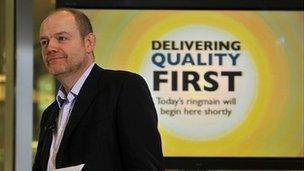BBC cuts 'will harm local radio' warn staff
- Published

BBC director general Mark Thompson announced a plan to make budget cuts last month
Budget cuts to BBC local radio stations will harm programme quality, staff have warned the director general.
Radio Merseyside presenter Roger Phillips challenged Mark Thompson at the Radio Festival in Salford.
He said reducing the BBC budget by 20% over five years would mean the station losing 15 of its 46 staff, meaning "we can't provide quality at all".
Mr Thompson said he would look for ways of making savings that "minimise the impact on quality".
Under the savings plans, local stations will share some programmes outside peak times, with a total of 280 posts under threat.
Stations such as Radio Merseyside will continue to broadcast their own shows in the breakfast, mid-morning and drive-time slots.
"We'll keep the presenters there but we can't apply any quality because we'll lose about 15 staff out of 46," Mr Phillips said.
"There's no way we can put any real input into those news and current affairs issues."
Criticising BBC management's decision to treat all local stations equally, he said: "It is salami slicing.
"We can't provide quality at all," he added. "Our afternoon programme's been protected but we can't provide input."
Highlighting the coverage of the August riots on local stations, BBC Radio Manchester sports editor Sarah Collins said the plan to share shows with neighbouring stations put the relationship with listeners in jeopardy.
"The riots proved the value of localness," she said. "It's what we do every day.
"Without localness, BBC local radio is nothing. In these difficult times for all of radio, if you dilute localness, then you do it at our peril."
Mr Thompson admitted that "the impact in terms of jobs in local radio is high".
But referring to the timeslots that account for 85% of listening, he said: "We hope that the editorial impact on those key day-parts is going to be manageable."
'Audiopedia' plan
He pointed to Premier League football, where the BBC currently sends separate commentary teams for Match of the Day, 5 live and two local stations, as one possible area for savings.
"We have four different BBC commentary teams covering one football match," he said.
"You've at least got to ask yourself the question, in 2011 when every public institution and most private companies are having to cut back, whether sending four commentary teams can still make sense."
Meanwhile, Mr Thompson also announced a new online venture dubbed "Audiopedia", which would make speech programmes from the BBC archive available to download.
Users will be able to search for shows by programme, subject or person, he said.
The scheme follows the success of putting 500 archive episodes of Desert Island Discs online, generating a total of five million downloads, while every edition of Melvyn Bragg's In Our Time is also available to download.
'Stronger' approach
In a separate development, the National Audit Office (NAO) said a BBC efficiency drive that saved hundred of millions of pounds could potentially have saved even more money.
The NAO report said the corporation cut its annual expenditure by £396m by the end of 2010-11 following the 2007 licence fee settlement.
Amyas Morse, the head of the NAO, said: "The BBC's efficiency programme is on track while its overall performance, measured in terms of audience, has not declined.
"The efficiency programme is therefore proving a clear success in the terms set for it. However, it is hard to say whether the target set was stretching enough and the BBC cannot say whether all the savings made amount to real gains in efficiency.
"To manage within its 2010 licence fee settlement, the BBC must strengthen its approach to targeting savings and create a culture of continually challenging how services are delivered."
- Published6 October 2011
- Published6 October 2011
- Published6 October 2011